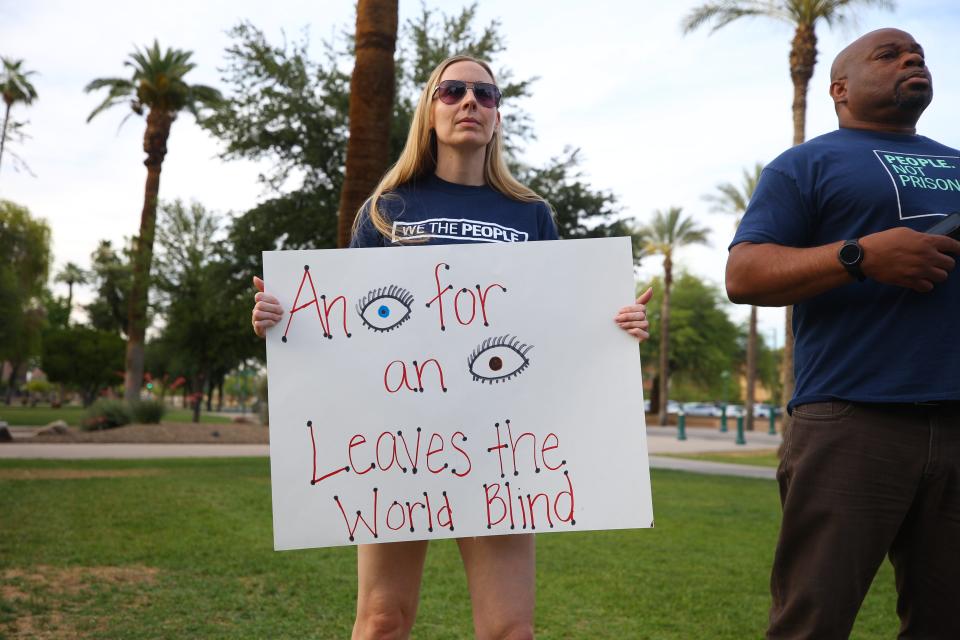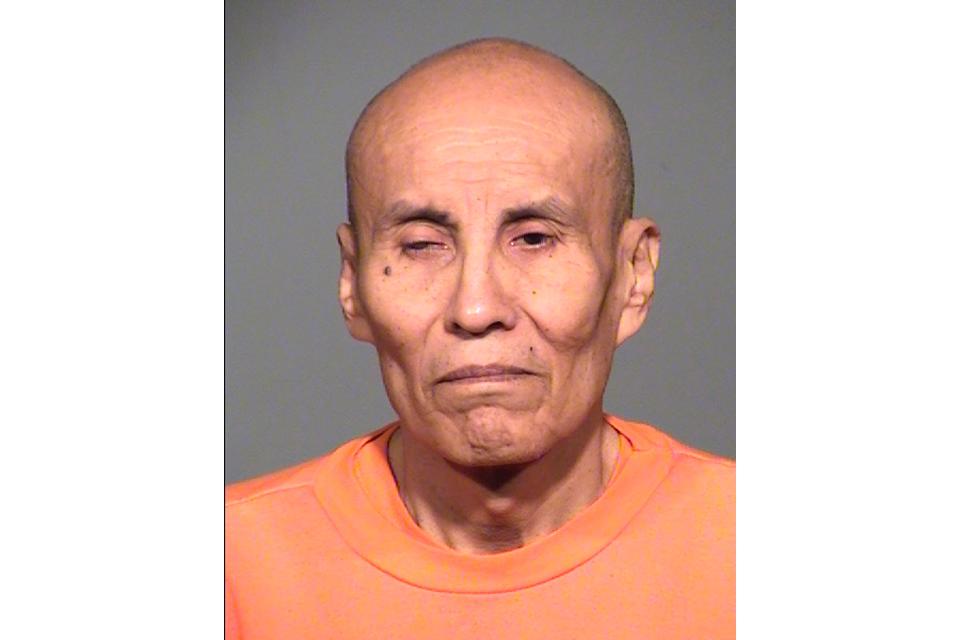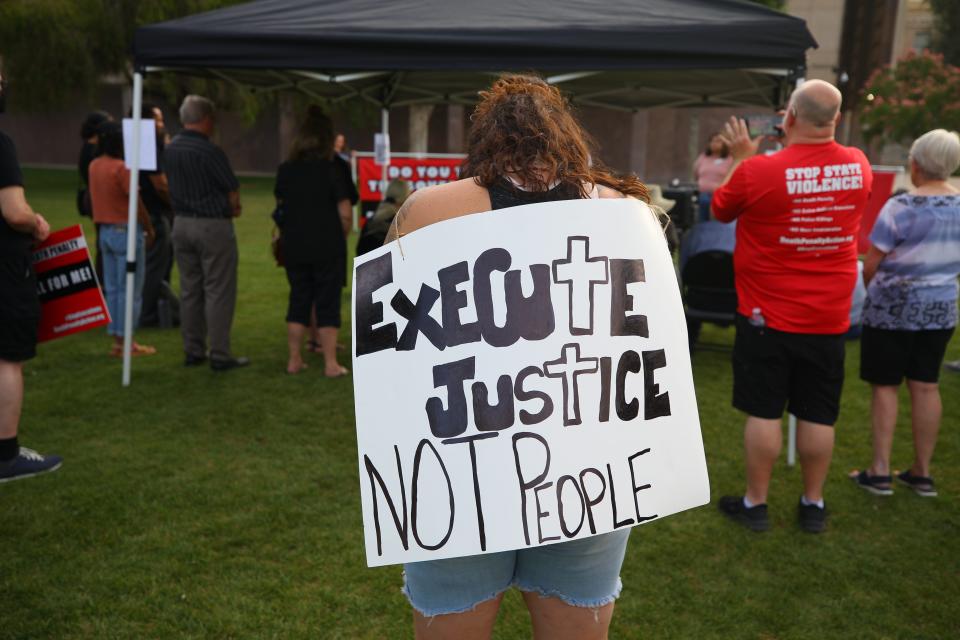Arizona to execute first person in 8 years, advocacy groups hold vigils: 'Death is not justice'
PHOENIX – Two groups held vigils Tuesday night, the evening prior to Arizona's first scheduled execution since 2014.
Clarence Dixon was convicted and sentenced to death in 2008 for the 1978 murder of Arizona State University student Deana Bowdoin. He's scheduled to be executed on Wednesday and will be the first person to be executed in Arizona since the botched execution of Joseph Wood in 2014.
Death Penalty Alternatives for Arizona, a nonprofit that aims to abolish the death penalty in Arizona, organized one of the vigils alongside Arizona Faith Network, American Civil Liberties Union of Arizona and Mass Liberation Arizona. It was held at the Arizona Capitol in Phoenix.
Dale Baich, a former public defender who has represented people on death row for 33 years and is an adjunct professor teaching an Arizona State University course on the death penalty, said the effort to impose the death penalty is often a futile one.
“Since 1973, 321 people have been sentenced to death in our state,” Baich said. “Just over 50% of those sentenced to death had their sentences vacated. In other words, the death penalty fails half the time when a death sentence is imposed.”
Baich said people sentenced to death are often offered a life sentence but are only executed because they exercised their constitutional right to a trial. Baich called for Arizona and its leaders to reflect on whether the death penalty is a viable form of justice.

“It is my hope that we have a fair and honest debate in Arizona as to whether the death penalty is sound public policy or a relic from our past that should be abandoned,” Baich said. “I hope our leaders in the Legislature will take serious strides to begin the discussion and safeguard human rights.”
Khalil Rushdan, organizing director with the ACLU of Arizona who was formerly incarcerated at an Arizona prison, said he recalled working in the kitchen one day when he saw a death row inmate’s last meal written on the board and prison guards walked around as though it was a normal day.
“That day was the only day that it was silent,” Rushdan said. “Everybody on that yard knew what’s going on.”
Rushdan said the portrayal of the death penalty as justice for victims is a false narrative.
“I stand here today committed to do whatever I can because the death penalty is a random act of brutality, “Rushdan said. “Its application throughout the United States is random depending on where the murder occurred, the race and economic status of the person who is accused of it and the person’s access to counsel.”
Bruce Franks Jr., an organizer with Mass Liberation Arizona, called the death penalty a brutal and racist practice that allows the government to determine whether one's life is disposable.
"Capital punishment is nothing more than a violent, racist tool of white supremacy," Franks said. "Death is not justice."
Franks accused Arizona Attorney General Mark Brnovich of using Dixon's execution as a political ploy for his U.S. Senate campaign.
"Brnovich, who claims to be pro-life, is resuming executions so he can gain support from his right-wing base in the time of the midterm election," Franks said. "Brnovich seeks to exchange Clarence Dixon's precious life and the life of countless others on death row for votes."
“We must fortify ourselves with community care to be bold and courageous enough to truly imagine a world together where we know deeply in our bones that caging people and state-sanctioned murders is not the solution to what ails us,” Franks said.
Kat Jutras, Death Penalty Alternatives for Arizona's state advocacy director, equated the death penalty to "state-sanctioned murder."

“What’s happening to Clarence Dixon could happen to anyone who suffers from a debilitating mental illness and who was neglected by our justice system and not provided with resources, tools and treatment to be successful,” Jutras said in a written statement. “The death penalty makes communities less safe and siphons resources from programs that reduce and prevent crime.”
Death Penalty Alternatives for Arizona is also planning to protest the execution at the Florence state prison Wednesday morning.
Nation: US executions, death sentences fall in 2021 to lowest levels in decades, report finds

Appeals by Dixon for commutation
Dixon was denied his request for commutation or reprieve last week by the Arizona Board of Executive Clemency. His lawyers have filed a flurry of last-minute appeals and challenges and were waiting late Tuesday for a possible review by the U.S. Supreme Court after the 9th Circuit Court of Appeals denied a motion.
One challenge did end in the state making a new batch of drugs to be used for the execution.
Dixon's attorneys argued that Dixon has suffered from schizophrenia from an early age, experienced auditory and visual hallucinations and displayed delusional thoughts, but Board of Clemency members found Dixon to be mentally competent.
Prayer vigil also scheduled
Also on Tuesday, Bishop Thomas Olmsted of the Roman Catholic Diocese of Phoenix led a prayer vigil at Saints Simon and Jude Cathedral in Phoenix.
The vigil was also livestreamed on Youtube.
Olmsted was joined by Bishop Eduardo Nevares, the Sisters of Life and others to "pray together for victims, for aggressors, and for the state to abolish use of the death penalty."
Last week, the Bishops of the Arizona Catholic Conference issued a statement against the resumption of executions in the state. The statement said the bishops support compassion for the victims of crimes, but also called for prayers for the soul of Clarence Dixon.
"As bishops, our primary opposition to the death penalty is rooted in the teaching of the Catholic Church that every person is created in the image and likeness of God," the statement read. "For this reason, we are compelled to uphold the sacred dignity of all human life."
What's next for the death penalty? Melissa Lucio's case deepens questions about capital punishment.
Follow Perry Vandell on Twitter: @PerryVandell.
This article originally appeared on Arizona Republic: Arizona to execute first death-row inmate in 8 years, vigils held

